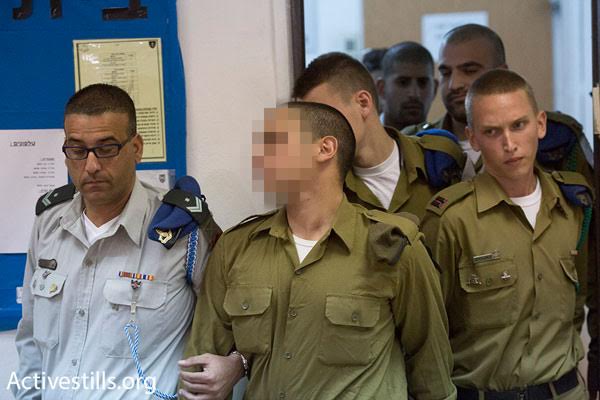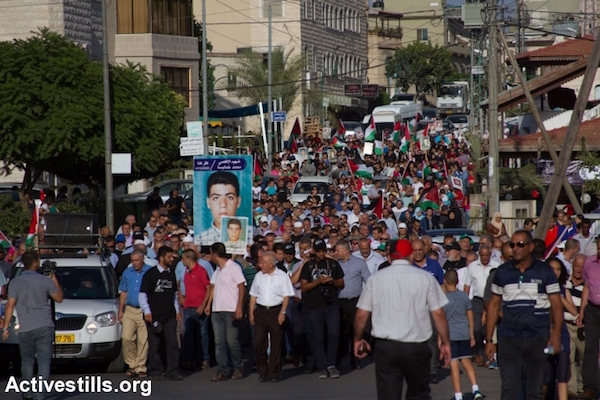The IDF’s decision not to charge Abed Fatah al-Sharif’s killer with murder should not surprise anybody — it is entirely consistent with the impunity Israeli security personnel have enjoyed for decades when it comes to killing Palestinians.

The Israeli army’s Military Advocate General on Thursday announced that it will not seek murder charges against a soldier who was videotaped executing Abed Fatah al-Sharif, an incapacitated, wounded Palestinian man suspected of stabbing a soldier in the occupied West Bank city of Hebron last week. (The soldier’s identity is widely known but cannot be published here due to a court-imposed gag order.)
The decision surprised some, although it is not quite clear why. To the best of my knowledge no Israeli soldier has ever been charged with murder for killing a Palestinian.
According to Israeli human rights group Yesh Din, in the period between 2003 and 2013 (excluding 2010, for which the IDF refused to provide data, possibly because that data would cover the Mavi Marmara incident), military police opened criminal investigations into the killing of 179 Palestinians. Of those investigations, only 16 led to indictments. None of the indictments carried murder charges.
When Israeli soldiers are charged with illegally killing a Palestinian or a foreign national, the charges range from nominal lesser crimes like illegal, reckless or negligent use of a weapon, to more slightly-more-serious ones like negligent manslaughter or manslaughter.
Even the most egregious and seemingly clear-cut cases of intentional, unjustified killings of Palestinians — both by Israeli soldiers and Border Police officers — have resulted in minimal charges or none at all.
One case from 2010, which is breathtakingly similar to the execution of Abed Fatah al-Sharif, resulted in no charges at all. Border Police officer Maxim Vinogradov fatally shot Ziad Jilani, a Palestinian resident of East Jerusalem, directly in the head at close range while the latter lay wounded in the middle of the street. No charges at all.
Just a day before the army announced that Abed Fatah al-Sharif’s killer will face manslaughter rather than murder charges, the IDF prosecutor announced it was closing its investigation into another high-profile, video-taped shooting death: the killing of Mohammed Abu Taher, an unarmed Palestinian teenager who was shot by a sharpshooter at a protest in 2014. The army concluded that Abu Taher was not hit by IDF fire.

A Border Police officer was charged with manslaughter for the death of a second unarmed teen, Nadim Nawara, at that same 2014 Nakba Day protest — but not for killing Abu Taher. The two, whose deaths were captured by CCTV cameras, were shot in the back with live fire from a distance while posing no threat to anybody.
In another case, the soldiers who fatally shot 16-year-old Samir Awad in the back near the West Bank village of Budrus in 2013 were charged with a negligible crime of little legal consequence considering what they did: reckless and negligent use of a firearm.
Likewise, no soldiers were charged in the fatal shooting of 14-year-old Yousef Shawamra, whose only crime was crossing Israel’s separation barrier in order to forage for edible plants. The army initially justified killing the 14 year old by saying he was trying to damage the barrier, as if attempted vandalism is a capital offense for Palestinians.
One of the most shocking cases, which received widespread media attention in Israel and abroad, was the IDF captain who admitted to fatally shooting a 13-year-old girl, Iman al-Hams, at close range in the Gaza Strip in 2004. He was acquitted of all charges, the most serious of which were illegal use of a weapon and conduct unbecoming of an officer.
Inside the Green Line, not a single Israeli police officer was charged in the October 2000 shooting deaths of 13 Palestinians (12 of them Israeli citizens) in northern Israel. Most of the dead were killed by Israeli snipers who police commanders deployed, inexplicably, for a crowd control mission.

The list goes on. And on.
Even in the rare cases when Israeli security forces were charged and convicted with murder, like the 1956 Border Police massacre of 48 Palestinian citizens of Israel in Kafr Qasim, the convicted security personnel were quickly pardoned and released from prison. The commander responsible for the Kafr Qasim massacre was handed down nothing more than a symbolic fine of several cents.
***
With that historical context in mind, it is no wonder the Israeli public is rallying around the soldier accused of executing Abed Fatah al-Sharif. Why is his case any different than the bullets Israeli soldiers and officers put in the heads of Iman al-Hams or Ziad Jilani, or in the backs of Muhammad Abu Taher, Nadim Nawara, and Samir Awad?
Following the October 2000 killings, a special government commission put much of the blame for the killings on the police’s pervasive view of Arab citizens as an enemy population. In the West Bank where combat soldiers are charged with policing an “enemy” civilian population, such attitudes are not just prevalent — they are policy.
And those attitudes are not limited to the security forces. A poll late last year found that the majority of Jewish Israelis support the extra-judicial killing of Palestinians suspected of perpetrating attacks against Jews, “even if [they have] been apprehended and no longer pose a threat.”
The devaluation of Palestinian lives and disregard for rule of law demonstrated in that poll, the public support being expressed for Abed Fatah al-Sharif’s killer, the authorities’ unwillingness to seriously prosecute security personnel who murder Palestinians — perhaps all that is inevitable in a society that has kept Palestinians under military rule for 67 out of its 68-year existence.
The devaluation of Palestinian lives by Israelis will remain inevitable as long as Palestinians are denied the same civil and human rights afforded to the Israeli civilian population living in their midst. The devaluation of Palestinian lives will remain inevitable as long the Palestinian civilian population is ruled by a foreign army instead of security forces accountable to a government it elects.
There is only one way to ensure that Palestinian lives matter, and that is to end the occupation.


